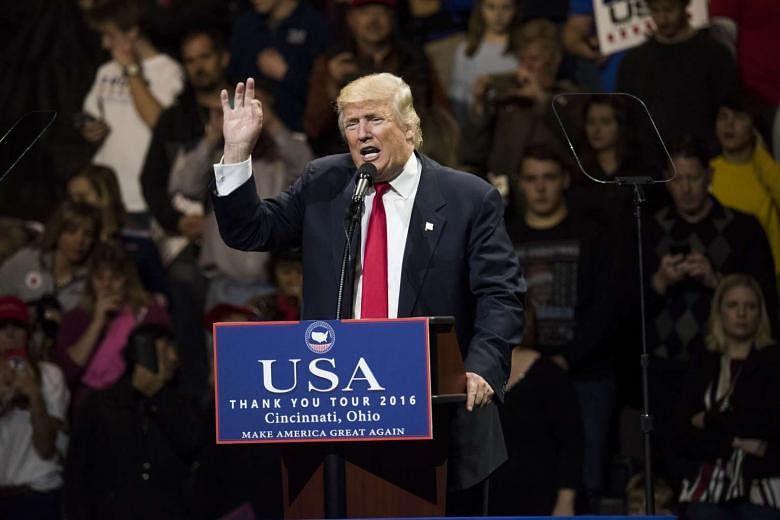NEW YORK (NYTIMES) - In President-elect Donald Trump's newly named kitchen Cabinet of business advisers, Wall Street is in. Silicon Valley is out.
Trump has named 16 business leaders to serve on what's being called the President's Strategic and Policy Forum, described as a group meant to guide his administration on economic matters.
The list is notable for leaning toward New York executives and industries - finance in particular. The list echoes Trump's picks for a number of major economic positions, including Treasury secretary (former Goldman Sachs partner and hedge fund manager Steven T. Mnuchin) and commerce secretary (billionaire investor Wilbur L. Ross).
Given his long experience as a New York real estate investor, Trump's selections may not come as a surprise.
"Donald comes from the financial services world. I think he tends to pick people who he's comfortable with," Stephen A. Schwarzman, co-founder and chief executive of the Blackstone Group, who is leading the forum effort, told CNBC Friday afternoon.
The forum largely excludes technology, home to some of the nation's best-known, most innovative and biggest companies by market value, which represented more than 8 percent of the private sector economy last year, according to the Bureau of Economic Analysis.
It is a bipartisan list, nonetheless, with members who traditionally have favored Democratic candidates, including Laurence D. Fink of the asset management colossus BlackRock, Mary T. Barra of General Motors and Robert Iger of Walt Disney.
"This forum brings together CEOs and business leaders who know what it takes to create jobs and drive economic growth," Trump said in a statement.
"My administration is committed to drawing on private sector expertise."
The group is expected to meet with Trump monthly. The first meeting will be at the White House in early February. Schwarzman will serve as chairman.
The private equity titan is a longtime Republican donor who has known the president-elect for years. Trump and his wife, Melania, were among the guests to the Blackstone chief's famous 60th birthday party in 2007.
Schwarzman was not a vocal supporter or fundraiser for Trump. Since the election, however, he has embraced the notion that the president-elect's promise to pull back financial regulations and cut taxes will supercharge the economy.
In public and in private, Schwarzman has lately said that he is "excited" about the potential for economic growth in a Trump administration.
"The business community now becomes front and center," he said at a recent Wall Street Journal conference.
At the conference, Schwarzman listed likely changes under Trump, including a loosening of lending regulations, a lowering of the corporate tax rate from its 35 per cent level, and a return of the more than US$1 trillion that US companies hold abroad to avoid US taxes.
"There are going to be so many of these changes that I think what's going to happen, it's really going to force growth from a policy perspective," Schwarzman said at the conference.
Despite his support for Trump's policies, Schwarzman has signalled privately that he would not commit to a full-time position in the administration, but was otherwise interested in helping to advise the president-elect.
Other Wall Street heavyweights on the list are Jamie Dimon, chief executive of JPMorgan Chase, and Adebayo Ogunlesi, a former Credit Suisse executive who is chairman of the investment firm Global Infrastructure Partners. Ogunlesi is also a board member at Goldman Sachs. No Goldman executives were named to the forum.
Forum members with ties to the finance industry include Paul S. Atkins, a former commissioner of the Securities and Exchange Commission who is the chief executive of a finance regulation consulting firm, and Kevin Warsh, a former Morgan Stanley executive and a former governor of the Federal Reserve.
Fink's presence is somewhat eyebrow-raising given his ties to the Democratic Party. He had sometimes been bandied about as a potential Treasury secretary in a Hillary Clinton administration, though his status as the head of the world's biggest asset management firm made that seem politically unlikely. Trump is an investor in a fund managed by BlackRock.
Dimon is easier to understand. Though initially a supporter of President Barack Obama, the JPMorgan chief has long been critical of the current administration's financial regulatory overhaul. While his name had been floated as a potential candidate for Treasury secretary, people close to him have insisted that he had no interest in taking on a full-time commitment outside his bank.
Aside from Virginia M. Rometty of IBM, there is hardly any representation of technology companies, and certainly none from Silicon Valley.
Perhaps that's unsurprising, given Trump's slim public support in the Bay Area. Among his biggest champions is Peter Thiel, the PayPal co-founder and Facebook board member, who is a member of the Trump transition team.
Not many other technology executives have come out as Trump backers publicly, aside from Thiel associates like Joe Lonsdale, co-founder of the data consulting firm Palantir, and Jack Abraham, executive director of the Thiel Fellowship.
Indeed, many Silicon Valley luminaries have opposed Trump since the presidential campaign. Eric Schmidt, executive chairman of Google's parent company, Alphabet, was an enthusiastic supporter of both Obama and Clinton.
The rest of the advisory group appears to be a bipartisan mixture of business chiefs drawn from the worlds of finance, media and manufacturing. They include Barra, Iger, Doug McMillon of Wal-Mart and W. James McNerney Jr., formerly of Boeing.
The most curious selection may be that of John F. Welch Jr., former head of General Electric. The current GE chief, Jeffrey R. Immelt, a Republican, is not on the list of advisers. Immelt had criticized Trump's comments about Mexicans and Muslims.
Trump's style and speech are sometimes seen as throwbacks to the Reagan administration, and Welch was the iconic business leader of that era.

